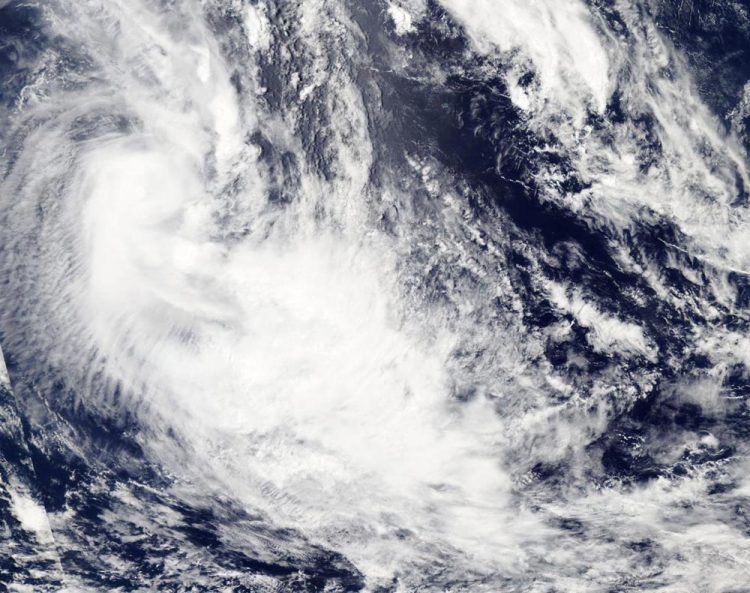NASA spies Tropical Cyclone 08P's formation

On Feb. 21, the MODIS instrument aboard NASA's Aqua satellite captured a visible image of newly formed Tropical Cyclone 08P. Credits: NASA Goddard MODIS Rapid Response Team
Tropical cyclone 08P developed on Feb. 22 at 0300 UTC (Feb. 21 at 10 p.m. EST), and strengthened by 1500 UTC (10 a.m. EST) into a tropical storm with maximum sustained winds near 35 knots (40 mph/62 kph).
08P is expected to maintain strength over the next day as it moves in a southeasterly direction in the South Pacific's open waters. 08P was located near 25.4 degrees south latitude and 165.8 degrees west longitude, about 660 nautical miles south-southeast of Pago Pago, American Samoa.
08P is moving to the southeast at 33 knots (38 mph/61 kph).
Like its predecessor Bart, Tropical Cyclone 08P is also dealing with vertical wind shear despite forming under those conditions.
The MODIS or Moderate Resolution Imaging Spectroradiometer instrument aboard NASA's Aqua satellite took a visible image of the storm on Feb. 21 as it was developing.
The MODIS image showed wind shear was pushing the clouds and strongest storms southeast of the low-level center of circulation. The MODIS image also showed that 08P is elongated from northwest to southeast.
The Joint Typhoon Warning Center or JTWC noted that dry air associated with a nearby trough (elongated area of low pressure) is wrapping around the northern quadrant of Tropical Cyclone 08P. JTWC expects 08P to become extra-tropical in a day.
Media Contact
All latest news from the category: Earth Sciences
Earth Sciences (also referred to as Geosciences), which deals with basic issues surrounding our planet, plays a vital role in the area of energy and raw materials supply.
Earth Sciences comprises subjects such as geology, geography, geological informatics, paleontology, mineralogy, petrography, crystallography, geophysics, geodesy, glaciology, cartography, photogrammetry, meteorology and seismology, early-warning systems, earthquake research and polar research.
Newest articles

Pinpointing hydrogen isotopes in titanium hydride nanofilms
Although it is the smallest and lightest atom, hydrogen can have a big impact by infiltrating other materials and affecting their properties, such as superconductivity and metal-insulator-transitions. Now, researchers from…

A new way of entangling light and sound
For a wide variety of emerging quantum technologies, such as secure quantum communications and quantum computing, quantum entanglement is a prerequisite. Scientists at the Max-Planck-Institute for the Science of Light…

Telescope for NASA’s Roman Mission complete, delivered to Goddard
NASA’s Nancy Grace Roman Space Telescope is one giant step closer to unlocking the mysteries of the universe. The mission has now received its final major delivery: the Optical Telescope…



